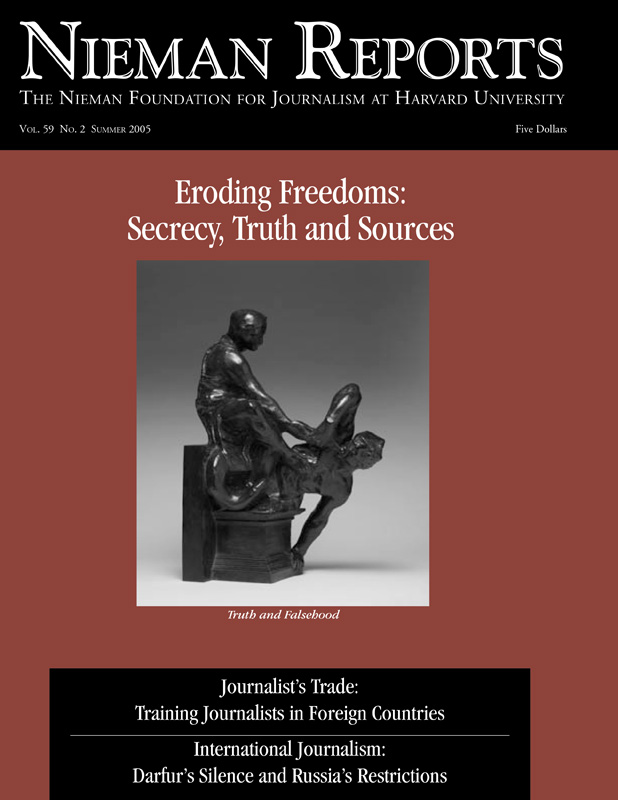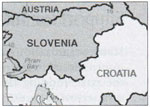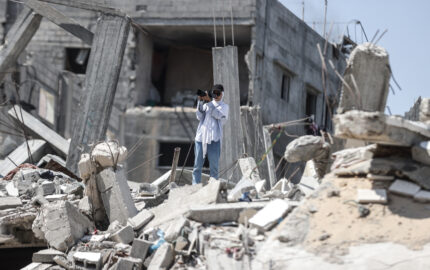It’s been two years since I returned from the republic of Slovenia. I still yearn for the scale and beauty of the land and the warmth and strength of its people.
As for the remnants of its Soviet bureaucracy— that I can do without.
The U.S. Department of State invited me to spend three weeks in this East European country as part of its ongoing program to help emerging democracies develop their news media. My assignment was to train journalists at RTV Slovenia, the national radio and television network. I went with a colleague, also a trainer, who was able to stay another month.
We had a lot of success. We could have had much more. Here is what we found when we arrived:
In other words, this assignment was shot through with challenges before it began. In spite of them, we accomplished quite a lot.
We met with 16 managers during our first week. To a person, they opened their hearts and poured out their frustrations about the challenges they face trying to figure out what’s going on—much less how to do excellent work—in a system that stymies communication and discourages innovation. Several wept as they spoke. Clearly they’d never had the opportunity to express their dismay to understanding professionals who affirmed their concerns.
Their stories revealed a work place in which people have responsibility for things they are not authorized to effect, mediocrity goes without consequences, excellence is rarely rewarded, and the organizational structure thwarts even insiders from figuring out who is accountable to whom.
I led seven workshops on how to tell compelling news stories, generate original story ideas, make ethical decisions, and shoot and edit engaging video. In all, more than 60 people participated in these lively, interactive discussions, from the program director to college interns. In each session we discussed the special responsibility they have to show how the biggest issues of the day connect to the daily lives of citizens, to explain complex subjects through the eyes of people whose lives are directly affected by them, and to search for the stories that hold the powerful accountable and give voice to the voiceless.
Nearly all of the participants expressed enthusiasm for these ideas and many took copious notes. The two exceptions—unfortunately involving powerful inside players—were the senior government reporter and the executive producer of the evening newscast. The government reporter contended our thesis was flawed: “We don’t have the concern the American networks have about how many people watch our newscasts. We get the license fees that support us from every citizen regardless of whether they watch.” That moment was one of the trip’s low points.
The high points were the coaching sessions with individual journalists and managers. I reviewed samples of their work, discussed ways to overcome their greatest challenges, and offered ideas about managing the people who report to them as well as their own bosses. Typically these sessions ended with warm hugs and poignant expressions of gratitude from the recipients.
Communism’s Remnants
A few days into our visit we realized few of the network’s executives were even aware of our presence. We scheduled first one and then a second meeting with the general manager. He cancelled both. Finally we met with a deputy director. His biggest concern was determining who was responsible for bringing us and where the money had come from to pay us. At one point he indicated that after nearly three weeks on the job we might actually have shown up at the wrong location.
“Maybe you are supposed to be at Pop TV,” he said, referring to RTV Slovenia’s competitor. He was quite disturbed and eager to place blame elsewhere for the obvious lack of preparation for our visit. “Are you sure you’re supposed to be here?,” he asked.
Clearly we were dealing with the same post-Soviet bureaucracy that created RTV Slovenia in 1994. The organizational structure it built is as different from that of American media companies as it can be. Some of the top executives are elected by Parliament, some by a broadcast oversight committee whose membership is a dizzying array of 25 different union representatives, and some—a very few—are hired by the general manager. All of this is mandated by the federal constitution in an effort to accommodate the country’s various ethnic groups.
Even so, RTV Slovenia manages to produce a spectacular amount of material beyond anything an American network would dare attempt: more than 300 programs a year, ranging from children’s fare to national song competitions to daily newscasts to documentary series to feature-length films. It runs two television and three radio channels that include Italian and Hungarian language programs.
With all that investment of time and resources, few of the programs air more than once. The various production units rarely communicate. Efficiencies in production, research and personnel do not occur. There is no cross promotion among radio, television and online. The program schedule changes by the week, and sometimes by the day, so that it is nearly impossible to know when a particular program will be broadcast.
It is the living definition of “Balkanization.”
Next Steps
Enormous potential resides in Slovenia, and Americans have an interest in seeing it realized. The news trends in this country of two million are like those in the United States. People increasingly turn away from newspapers and towards television—and soon the Internet— as their primary source of news and information. Strengthening their television journalism will strengthen their democracy.
If the U.S. Department of State wants to help this process along, it’s time to develop a strategy to address it directly, country by country.
RELATED ARTICLE
"Tips for American Trainers"
- Valerie HymanAs things now stand, a small office at the State Department tries to maintain a stable of trainers to respond to foreign government invitations as they are received. A more effective plan would be to identify countries where the news media need support and assertively seek to place trainers there. The State Department could connect the trainers with each other, something that does not now happen, and create programs to train indigenous trainers.
Countries like Slovenia can be more influential than their size alone would predict. It joined the European Union last year, shares borders with Italy, Austria, Hungary and Croatia, and soon it will be a tourist destination.
My brief encounter with the people of RTV Slovenia deepened my appreciation for the strength and optimism and confidence embedded in the American press. If only for a few moments, that strength gave hope and encouragement to professionals who otherwise are quite forlorn. Perhaps we helped them imagine next steps on their path to journalistic vigor.
Valerie Hyman, a 1987 Nieman Fellow, works as a news and management consultant to television and radio stations and media corporations. She worked for 12 years as a reporter before becoming a news executive with a television station group. She later founded the broadcast program at the Poynter Institute and ran it for 10 years.
As for the remnants of its Soviet bureaucracy— that I can do without.
The U.S. Department of State invited me to spend three weeks in this East European country as part of its ongoing program to help emerging democracies develop their news media. My assignment was to train journalists at RTV Slovenia, the national radio and television network. I went with a colleague, also a trainer, who was able to stay another month.
We had a lot of success. We could have had much more. Here is what we found when we arrived:
- The idea to bring Americans to coach the newsroom staff came from a lowlevel manager who worked outside of the news department.
- No one poured the foundation required for us to get widespread support inside the organization.
- The bureaucratic structure of RTV Slovenia is antithetical to the absorption and dissemination of new ideas.
In other words, this assignment was shot through with challenges before it began. In spite of them, we accomplished quite a lot.
We met with 16 managers during our first week. To a person, they opened their hearts and poured out their frustrations about the challenges they face trying to figure out what’s going on—much less how to do excellent work—in a system that stymies communication and discourages innovation. Several wept as they spoke. Clearly they’d never had the opportunity to express their dismay to understanding professionals who affirmed their concerns.
Their stories revealed a work place in which people have responsibility for things they are not authorized to effect, mediocrity goes without consequences, excellence is rarely rewarded, and the organizational structure thwarts even insiders from figuring out who is accountable to whom.
I led seven workshops on how to tell compelling news stories, generate original story ideas, make ethical decisions, and shoot and edit engaging video. In all, more than 60 people participated in these lively, interactive discussions, from the program director to college interns. In each session we discussed the special responsibility they have to show how the biggest issues of the day connect to the daily lives of citizens, to explain complex subjects through the eyes of people whose lives are directly affected by them, and to search for the stories that hold the powerful accountable and give voice to the voiceless.
Nearly all of the participants expressed enthusiasm for these ideas and many took copious notes. The two exceptions—unfortunately involving powerful inside players—were the senior government reporter and the executive producer of the evening newscast. The government reporter contended our thesis was flawed: “We don’t have the concern the American networks have about how many people watch our newscasts. We get the license fees that support us from every citizen regardless of whether they watch.” That moment was one of the trip’s low points.
The high points were the coaching sessions with individual journalists and managers. I reviewed samples of their work, discussed ways to overcome their greatest challenges, and offered ideas about managing the people who report to them as well as their own bosses. Typically these sessions ended with warm hugs and poignant expressions of gratitude from the recipients.
Communism’s Remnants
A few days into our visit we realized few of the network’s executives were even aware of our presence. We scheduled first one and then a second meeting with the general manager. He cancelled both. Finally we met with a deputy director. His biggest concern was determining who was responsible for bringing us and where the money had come from to pay us. At one point he indicated that after nearly three weeks on the job we might actually have shown up at the wrong location.
“Maybe you are supposed to be at Pop TV,” he said, referring to RTV Slovenia’s competitor. He was quite disturbed and eager to place blame elsewhere for the obvious lack of preparation for our visit. “Are you sure you’re supposed to be here?,” he asked.
Clearly we were dealing with the same post-Soviet bureaucracy that created RTV Slovenia in 1994. The organizational structure it built is as different from that of American media companies as it can be. Some of the top executives are elected by Parliament, some by a broadcast oversight committee whose membership is a dizzying array of 25 different union representatives, and some—a very few—are hired by the general manager. All of this is mandated by the federal constitution in an effort to accommodate the country’s various ethnic groups.
Even so, RTV Slovenia manages to produce a spectacular amount of material beyond anything an American network would dare attempt: more than 300 programs a year, ranging from children’s fare to national song competitions to daily newscasts to documentary series to feature-length films. It runs two television and three radio channels that include Italian and Hungarian language programs.
With all that investment of time and resources, few of the programs air more than once. The various production units rarely communicate. Efficiencies in production, research and personnel do not occur. There is no cross promotion among radio, television and online. The program schedule changes by the week, and sometimes by the day, so that it is nearly impossible to know when a particular program will be broadcast.
It is the living definition of “Balkanization.”
Next Steps
Enormous potential resides in Slovenia, and Americans have an interest in seeing it realized. The news trends in this country of two million are like those in the United States. People increasingly turn away from newspapers and towards television—and soon the Internet— as their primary source of news and information. Strengthening their television journalism will strengthen their democracy.
If the U.S. Department of State wants to help this process along, it’s time to develop a strategy to address it directly, country by country.
RELATED ARTICLE
"Tips for American Trainers"
- Valerie HymanAs things now stand, a small office at the State Department tries to maintain a stable of trainers to respond to foreign government invitations as they are received. A more effective plan would be to identify countries where the news media need support and assertively seek to place trainers there. The State Department could connect the trainers with each other, something that does not now happen, and create programs to train indigenous trainers.
Countries like Slovenia can be more influential than their size alone would predict. It joined the European Union last year, shares borders with Italy, Austria, Hungary and Croatia, and soon it will be a tourist destination.
My brief encounter with the people of RTV Slovenia deepened my appreciation for the strength and optimism and confidence embedded in the American press. If only for a few moments, that strength gave hope and encouragement to professionals who otherwise are quite forlorn. Perhaps we helped them imagine next steps on their path to journalistic vigor.
Valerie Hyman, a 1987 Nieman Fellow, works as a news and management consultant to television and radio stations and media corporations. She worked for 12 years as a reporter before becoming a news executive with a television station group. She later founded the broadcast program at the Poynter Institute and ran it for 10 years.




